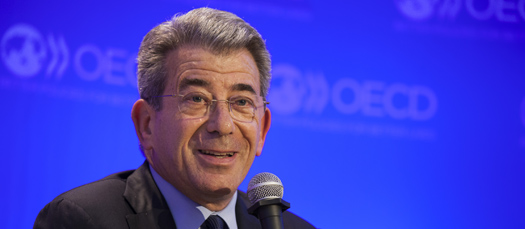The New Frontier of Performance
The three-year partnership between Sodexo and the Organisation for Economic Co-operation and Development is aiming at promoting Quality of Life as a factor in the development and progress of society and will enable the two groups to exchange on their complementary perspectives.

By helping emphasize the importance of a “better life” as a key component of societal progress, the OECD has made considerable efforts in recent years to help promote a school of thought that places people’s well-being at the heart of economic growth. After examining the issue of growth and productivity gains, and recognizing the question of the environmental cost of our economic activity, the time has come to turn our attention to another area that is equally crucial: fostering a more human economy.
The current crisis has revealed the limitations of our economic model. Decades of rationalization and efforts to improve processes, methods, structures and expertise have depleted the potential to boost productivity and exert an increasing amount of pressure on women and men. This pressure compromises the hope of finding personal fulfillment at work. What’s more, consumption never seems to provide satisfaction, regardless of income level. Our modern economies, as many economists point out, have not managed to combine growth and happiness.
Economies and companies face the same challenge: finding new resources for developing more harmonious growth – growth that delivers not just value, but also the fulfillment that should result from it. In my opinion, the solution can be summed up in two words: human beings. It is the duty of economic stakeholders to address this issue seriously in order to lay the foundations for harmonious growth.
At Sodexo, we have a vision. We believe that to create lasting value, organizations and society must place people at the center of their thinking. This is why we consider quality of life to be a key, and as yet largely unexplored, factor in individual and collective performance. We have made it our business and our raison d'être.
In companies, hospitals, schools, prisons and factories, the 20th century brought developed countries a number of logistic and technological solutions to the main quantitative challenges facing modern society: food, education, employment, production, transportation, medical care and so on. Today, if we wish to improve the performance of these collective places, people’s well-being will need to become the main focus.
In prisons, the aim is not just to guard the prisoners, but to create conditions favorable for their re-entry into society. In companies and factories, the aim is no longer just to manufacture, but to retain and motivate talent. In hospitals, the aim is no longer just to treat patients, but to protect their dignity and create an environment that provides comfort and psychological well-being to help along their recovery. In schools and universities, in an era when the Internet is making knowledge openly accessible, the most important question is how to create an environment that will foster motivation to learn.
The challenge everywhere is how to reconcile individual needs with the goals of organizations; how to recognize that organizations are also places where people live their lives; and how to place primary emphasis on what improves quality of life.
For many, this idea remains vague or too generalized. For us, it is a concrete and measurable topic.
A place elicits emotions and a certain amount of pride, appeal and engagement. Through their layout, functionality, openness to the outside world and symbolism, physical spaces create points of reference and a shared culture.
We have also noted that, through new services, organizations can free individuals of constraints and make life at work, or in sickness, absence or isolation, more bearable.
On a more individual level, quality of life in organizations can be assessed through details, which often appear to be crucial. I’m thinking here of the way people are affected by their environment in their professional and personal life, including such things as air quality, and by factors (which at times might seem of minor importance) that cause stress, such as waiting times in hospitals.
Individuals must also be viewed in terms of their relation to others. Maintaining emotional ties with loved ones while in hospital, in prison, on an oil platform or on campus, for example, can be an essential factor in these institutions’ success.
Decision-makers should also use quality of life as a tool that bolsters their strategies by focusing on the simplest and, at times, most invisible tasks. In practical terms, quality of life provides men and women with reasons to feel better and more respected; it speeds up their progress and, by extension that, of society as well.
In our dedication to improving quality of life, we are humbled by the scope of the task and stimulated by its importance to society. We take pride in our part in this fundamental revolution.
Today, the new frontier of performance is human. Shifting our focus back to men and women obviously has its roots in ethical considerations. But at last ethics is joining paths with economics–and this is the great hope for our time.
Recognizing the importance of the human element first of all leads to a rethinking of how to restore balance to the economy. The outlook for industry, IT services, banking and insurance is less promising than for those services where people are the primary focus. Health, well-being, safety and collective efficiency are key words that refer to many of tomorrow's new careers. This new industry obviously provides future prospects for employment and social advancement for people who often have limited formal qualifications. It is a tremendous driver for individual and social progress.
Recognising the importance of human beings also transforms business. The men and women working for a company must be the real beneficiaries of its success: this is without a doubt the best way of ensuring the company's sustainability. This rebalancing must inspire the company’s policies, in both the areas of diversity and inclusion. The integration of minorities, links between generations, equal opportunities for men and women, the integration of disabled employees, and respect for sexual orientation are all performance drivers. At all levels in our company and those of our clients, we have found that diversity helps make us stronger and more innovative.
The same applies to employee training and development. In making individual development a strategic priority, the company benefits on two fronts: it both increases its employees’ employability and improves their overall efficiency.
More than ever, companies’ global competitiveness depends on talent. Technological expertise and organizational quality will continue to be major concerns for large corporations. However, human resources are set to become the most universal, immediate source for driving competition in the future.
By developing policies focused on their men and women, companies will become stronger and more appealing, and their performance will improve. This will be not an outcome of their success, but a fundamental component of it. Ultimately, global corporations will play a central role by setting an example for how to operate, across all regions of the world.
Of course, recognizing the importance of human beings cannot be restricted to the corporate sphere alone. It must also lead to new perspectives in public policy by encouraging a more human-oriented economy and a new growth model. The world is vast, and for many nations the immediate priorities are fighting hunger, disease and poverty. In emerging countries, soaring double-digit growth has given hope to millions of people as they discover the consumer society from which they were excluded in the 20th century.
The “new frontier” is perhaps the furthest ahead. It is also the least equitably shared. This could lead us to question the scope of our ambition, and reinforces our deeply held belief that people are the cornerstone of future growth.
By Michel Landel, Sodexo CEO



